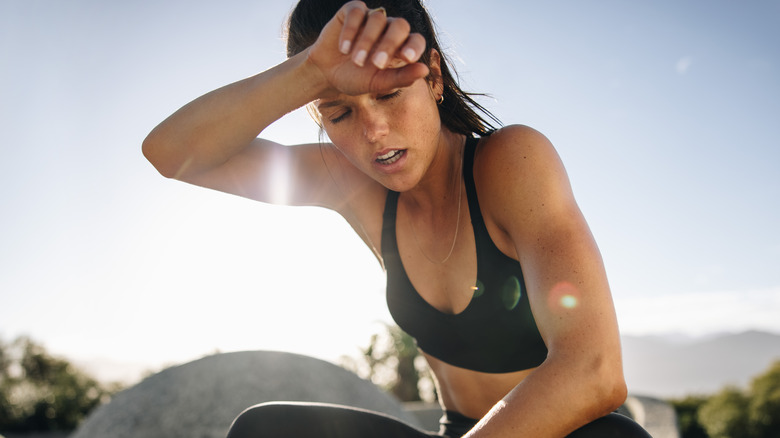The Real Reason Not Everyone Sweats
Have you ever walked out of a SoulCycle class and noticed that the person who was furiously pedaling next to you barely broke a sweat? Or perhaps you've been outside in the blazing sun and caught a glimpse at your friend, who looks cooler than the inside of a fridge. The truth of the matter is that some people don't sweat as much as others, and there are some who don't sweat at all.
According to a 2017 study published in Experimental Physiology, people who have larger bodies tend to sweat more than people with smaller bodies. Additionally, although it is a popular belief that males sweat more than females, the researchers found that body size and shape were more of a factor than sex when it comes to how much you sweat. Healthline states that genetics also contribute to how drenched you become during an uphill hike. We found out why and how much we sweat, but what is the real reason why some people don't sweat at all?
The inability to sweat can cause heat stroke
According to Healthline, the body's inability to sweat is actually a condition referred to as hypohidrosis or anhidrosis. It can affect a single area of your body, such as your armpit, or the condition can influence your whole body. Hypohidrosis or anhidrosis happens when your sweat glands are not able to function properly. It can become a concern if your body overheats, resulting in heatstroke.
As bothersome as moist clothing and pit stains may be, Medical News Today notes that sweating is a way for your body to cool itself down and continue functioning properly. For those who are unable to perspire, one medication that may help is prednisolone, a corticosteroid that is injected into the sympathetic nerve tissue in the neck. The shots are mainly reserved for those who can't sweat at all. People who have hypohidrosis or anhidrosis on specific parts of their body are typically encouraged to take preventative measures. Avoiding scorching heat and activities that raise the body's core temperature can help. If you suspect that your lack of perspiration may be impacting your health, make an appointment with your doctor to discuss the right treatment for you.


